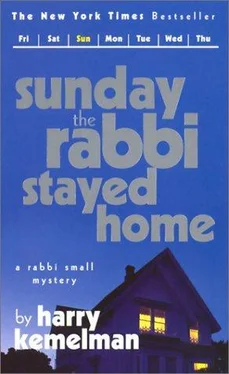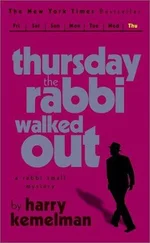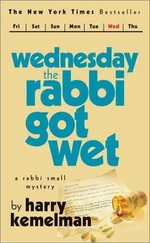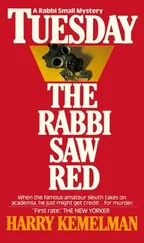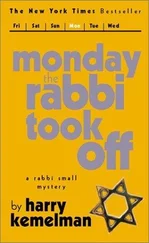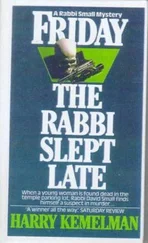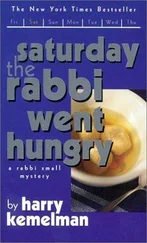Harry Kemelman - Sunday the Rabbi Stayed Home
Здесь есть возможность читать онлайн «Harry Kemelman - Sunday the Rabbi Stayed Home» весь текст электронной книги совершенно бесплатно (целиком полную версию без сокращений). В некоторых случаях можно слушать аудио, скачать через торрент в формате fb2 и присутствует краткое содержание. Город: New York, Год выпуска: 2002, ISBN: 2002, Издательство: iBooks, Жанр: Иронический детектив, на английском языке. Описание произведения, (предисловие) а так же отзывы посетителей доступны на портале библиотеки ЛибКат.
- Название:Sunday the Rabbi Stayed Home
- Автор:
- Издательство:iBooks
- Жанр:
- Год:2002
- Город:New York
- ISBN:978-0743452380
- Рейтинг книги:3 / 5. Голосов: 1
-
Избранное:Добавить в избранное
- Отзывы:
-
Ваша оценка:
- 60
- 1
- 2
- 3
- 4
- 5
Sunday the Rabbi Stayed Home: краткое содержание, описание и аннотация
Предлагаем к чтению аннотацию, описание, краткое содержание или предисловие (зависит от того, что написал сам автор книги «Sunday the Rabbi Stayed Home»). Если вы не нашли необходимую информацию о книге — напишите в комментариях, мы постараемся отыскать её.
Sunday the Rabbi Stayed Home — читать онлайн бесплатно полную книгу (весь текст) целиком
Ниже представлен текст книги, разбитый по страницам. Система сохранения места последней прочитанной страницы, позволяет с удобством читать онлайн бесплатно книгу «Sunday the Rabbi Stayed Home», без необходимости каждый раз заново искать на чём Вы остановились. Поставьте закладку, и сможете в любой момент перейти на страницу, на которой закончили чтение.
Интервал:
Закладка:
“In good voice. Cantor?”
“Fine, Rabbi.”
Mr. Wasserman looked old and frail swallowed up in the huge armchair reserved for the chairman of the Ritual Committee. He clasped the rabbi’s hand with both of his.
“Always I like to have the seder in my own house, but this year my children couldn’t come. And besides, sometimes for the good of everybody…”
Gorfinkle had been covertly watching the rabbi’s progress down the line. When he approached him, he rose and formally offered his hand.
“Stu planning to go back to school tomorrow?”
Gorfinkle shrugged. “He was hoping to, but I haven’t heard from Lanigan yet. Maybe he’ll call tonight.”
“It’s all right. He can go.”
“And the others?” asked Gorfinkle eagerly. “They too.”
Emotion welled up into Gorfinkle’s eyes. “That’s wonderful. Rabbi, just wonderful. I don’t know how we can ever thank you.”
The rabbi circled the table and took his seat. He looked out across the crowded room and waited for the last person to find his seat.
When he saw that the waiters had filled all the wineglasses, he nodded to the cantor, who rose and. holding his glass high, began to chant the benediction over the wine.
The men at the head table left the room for the ritual washing of hands, and when they returned, the rabbi dipped a sprig of parsley in a dish of salt water and recited the benediction over the fruits of the earth.
He uncovered the matzoh and removing the egg and the shank bone from the plate, passed it to Mr. Wasserman, who recited the Holachmanya, “Lo!, this is the bread of affliction which our ancestors ate in the land of Egypt; let all those who are hungry enter and eat thereof; and all who are in need come and celebrate the Passover…”
Once again the wineglasses were filled, and the rabbi nodded to the principal, who was seated at one of the round tables with the family of the youngster who was to ask the Four Questions. Morton Brooks whispered to the child, who stood up and in a childish treble began to recite: “Ma nishtanaha layla hazzeh…”
When the child finished, the rabbi placed on the table in front of him the tape recorder he had kept on the floor beside his chair. “The English translation was to have been given by Arlene Feldberg,” he announced, “but unfortunately. Arlene came down with the measles. However, we wouldn’t want her to miss her portion.” He pressed the switch—but it was his own voice that came through the machine, saying, “Sincerely yours. Make an extra copy, will you, Miriam?” This was followed immediately by the thin, reedy voice of the little girl: “Wherefore is this night distinguished from all other nights?” Weeks of coaching by the principal were reflected in the slow, stilted reading of the lines. “All other nights we may eat either leavened or unleavened bread, but tonight only unleavened.”
The rabbi looked down at Miriam. “You see.” he whispered. “I can bend a little.”
“And it works.” she whispered back.
“Why may we eat only bitter herbs… dip our food twice… eat while leaning?” Mr. Wasserman plucked at the rabbi’s sleeve, and he leaned over to hear what the old man was saying. The tape recorder whirred on. “…beg off from that dinner, will you. Miriam. Fib a little if you have to.” It was the rabbi’s voice.
There was a roar of laughter from the assembled company, and Miriam hastily reached forward and shut off the machine. The rabbi blushed and said. “We will now read in unison…”
Dinner was served, a traditional festive meal, beginning with gefilte fish and chicken soup. As soon as it was over, a number left, pleading that their children were tired and falling asleep at the table, but most stayed on for the rest of the service with its prayers, benedictions and ceremonial songs. At last the fourth cup of wine was drunk, and the president announced. “The order of the Passover is now accomplished and prescribed according to all its laws and customs…” and then all called out in loud and joyous voices the traditional fervent hope expressed for centuries by Jews all over the world at the end of the Passover service: “Next year in Jerusalem.”
The rabbi leaned over and whispered to Miriam, “Why not?”
“What?”
“The way things look, we’ll be free next year. Why not spend it in Jerusalem?”
Chapter Fifty-Nine
You’ve heard the minutes of the previous meeting. Any corrections or additions? Chair recognizes Mr. Sokolow.”
“Seems to me we spent most of the meeting arguing about a new contract for the rabbi, but there wasn’t a word of it in the minutes.”
“You left early, Harry.” said Gorfinkle. “It was decided not to mention it in the minutes for obvious reasons. What if the rabbi were here today? It might be embarrassing.”
“Well, so how do I know what happened?”
“I appointed a committee with Al Becker as chairman—maybe you’d like to fill him in. Al.”
“Sure.” Becker got up and walked to the head of the table. “We discussed mostly the terms of the contract. Some of the guys thought we ought to just make it for another five years, with a raise, of course. But there was a lot of sentiment for a lifetime contract, too. For that we’d have to discuss it with the rabbi himself.”
“So how’d you make out with the rabbi?” asked Harry Sokolow.
“Well, we decided not to speak to him just yet,” said Becker. “See, something came up that I think we ought to hash out first.” He cleared his throat. “At the end of this year, as many around this table may not realize, the rabbi will be rounding out his sixth year with us. So the new contract will be starting the seventh year. Well, a lot of congregations give their rabbi the seventh year as a sabbatical. So we on the committee didn’t want to get caught short if the rabbi raises that question without knowing beforehand the pleasure of this board. Speaking for myself, I’m all for offering it to him even before he asks.”
Immediately there was a storm of discussion. “Plenty of temples don’t give sabbaticals.”
“In my brother’s place they gave their rabbi a sabbatical last year, sure, but he had been there twenty years already.”
“Teachers get them.”
“Yeah, but only if they’re going to do some special study.”
“My wife tells me she heard the rebbitizin say they wanted to go to Israel. That seems a reasonable project for a sabbatical for a rabbi.”
“What does he need it for? After all, he gets the whole summer off. I should be so lucky.”
Mr. Wasserman was recognized. “The seventh year is a special time. It’s like the Sabbath year. What is the Sabbath? It’s something we invented, no? Six days you work, and on the seventh day you rest. Used to be people worked the whole seven days. So it’s ours—an invention. And the whole world accepted it—you should take one day in the week a rest. The only one who doesn’t get a rest one day in seven is the rabbi. On the Sabbath, when we get off, he works. And on the days we work he works, too. He’s a scholar, our rabbi, so that every day he’s at his studies. And when he’s not studying, he’s called different places to speak, or he goes to committees. And all the time, seven days a week, he’s still got the congregation. One day a Bar Mitzvah, the next day a wedding or, God forbid, a funeral. So the only way he can have a rest is if he goes away from the congregation and the community for a while where he won’t have to give sermons or be on committees or have to answer all kinds of questions. So I say, we should offer him this Sabbath if he asks for it, because I tell you the rabbi needs a rest sometimes from his congregation.”
Читать дальшеИнтервал:
Закладка:
Похожие книги на «Sunday the Rabbi Stayed Home»
Представляем Вашему вниманию похожие книги на «Sunday the Rabbi Stayed Home» списком для выбора. Мы отобрали схожую по названию и смыслу литературу в надежде предоставить читателям больше вариантов отыскать новые, интересные, ещё непрочитанные произведения.
Обсуждение, отзывы о книге «Sunday the Rabbi Stayed Home» и просто собственные мнения читателей. Оставьте ваши комментарии, напишите, что Вы думаете о произведении, его смысле или главных героях. Укажите что конкретно понравилось, а что нет, и почему Вы так считаете.
